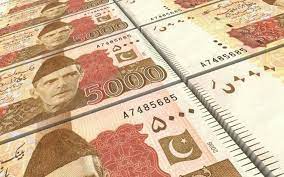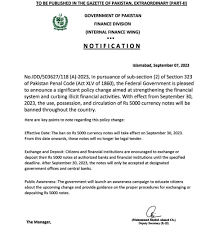Fake News
In recent months, there has been a surge of fake news circulating in Pakistan about the 5000 rupees currency note. These stories claim that the government is planning to ban the note, or that it is no longer legal tender. This has caused widespread panic and confusion, and has led to people rushing to banks to exchange their notes.
The truth is that there is no truth to these stories. The government has not announced any plans to ban the 5000 rupees note, and the note remains legal tender. The fake news stories are likely the work of unscrupulous individuals who are trying to create chaos and profit from the confusion.
Spread Of Fake News
The spread of fake news about the 5000 rupees note is a danger to financial stability in Pakistan. It can lead to people losing confidence in the currency, and can make it difficult for businesses to operate. It can also lead to social unrest, as people become desperate to exchange their notes.
There are a number of things that can be done to combat the spread of fake rumors about the 5000 rupees note. One is to educate people about the dangers of fake news. People need to be aware that these stories are not true, and that they should not be shared.

Another is to regulate social media platforms. Social media platforms need to take steps to remove fake rumors and news stories from their platforms. They also need to make it easier for people to report fake news stories.
Finally, people need to be more careful about the information they share online. Before sharing a news story, people should take the time to verify its authenticity. They should also be wary of stories that seem too good to be true.
By taking these steps, we can help to combat the spread of fake news and protect the financial stability of Pakistan.
Here are some additional tips for spotting fake news about the 5000 rupees note:
Check the source of the news story. Is it from a reputable news organization?
Look for other sources that corroborate the information. If you can’t find any other sources, it’s likely that the story is fake.
Be wary of stories that are too good to be true. If a story sounds too sensational, it’s probably not true.
Fake News : How it All Began
The origins of the 5000 rupees fake news can be traced back to early 2022 when an anonymous social media post claimed that counterfeit 5000 rupee notes were flooding the Pakistani market. The post featured images of these alleged fake notes and quickly gained traction, triggering a frenzy of discussions and debates across various online platforms.
The Viral Spread
As is often the case with sensational news, the story went viral within hours. People began sharing the post without fact-checking, and soon, it was all over social media, including Facebook, Twitter, and WhatsApp. The speed at which this fake news spread was astonishing, revealing the susceptibility of people to sensational content.
Impact on Society

The consequences of the 5000 rupees fake news scandal were far-reaching and profound. Let’s explore how this incident affected different aspects of Pakistani society.
Economic Disruption
One of the immediate effects was economic disruption. As people panicked and started questioning the authenticity of their 5000 rupee notes, there was a temporary drop in the circulation of these notes. Businesses and individuals became hesitant to accept them, leading to a slowdown in economic activities.
Trust Erosion
Trust is a fundamental pillar of any society. The circulation of fake news eroded trust not only in the currency but also in the information disseminated on social media. People began to question the credibility of news sources, making it harder to distinguish between genuine and fabricated information.
Government Response

The Pakistani government had to step in to address the crisis. Law enforcement agencies launched investigations to determine the source of the fake notes and the individuals behind the hoax. This incident shed light on the importance of government agencies’ ability to combat the spread of fake news swiftly.
The Role of Digital Literacy
While this incident highlights the negative aspects of the digital age, it also underscores the importance of digital literacy. Individuals must be equipped with the skills to critically evaluate information they encounter online. This includes fact-checking, verifying sources, and understanding the implications of sharing unverified content.
Conclusion
The 5000 rupees fake scandal in Pakistan serves as a stark reminder of the power and peril of information in the digital age. It revealed how misinformation can disrupt economies, erode trust, and strain government resources. To protect society from such incidents, it is crucial to promote digital literacy and responsible information sharing.
FAQs
1. What were the consequences of the circulation of fake 5000 rupee notes in Pakistan?
The circulation of fake notes led to economic disruption, eroded trust, and prompted government intervention.
2. How did the fake news spread so quickly on social media?
The sensational content of the news and the lack of fact-checking by users contributed to its rapid spread.
3. What steps did the Pakistani government take to address the issue?
The government launched investigations to identify the source of the fake notes and those responsible for spreading the hoax.
4. What can individuals do to protect themselves from fake news?
Individuals should practice digital literacy, including fact-checking and verifying sources, before sharing information.
5. How can society prevent similar fake news incidents in the future?
Promoting digital literacy and responsible information sharing is essential to prevent the spread of fake rumor and its consequences.
Disclaimer:
The information provided on Our News Blog “Fake News: Rupees 5000 Currency Note Ban in Pakistan?” is for general informational purposes only. All content on this Website is published in good faith and for general information purposes only. We do not make any warranties about the completeness, reliability, and accuracy of this information. Any action you take upon the information found on this Website is strictly at your own risk.









0 Comments